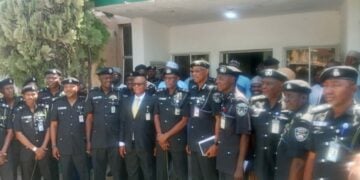The Independent National Electoral Commission (INEC) said yesterday Nigeria’s election process would not return to a period he described as the dark days.
According to INEC, there is no community in the country where election can’t be conducted electronically and the results transmitted electronically, adding that Nigeria cannot return to “Egypt” when it comes to election conduct.
Speaking at a stakeholders’ conference on election result management organised by YIAGA Africa, a civil society organisation (CSO) to launch the election result analysis dashboard (ERAD) report, INEC chairman, Mahmood Yakubu, said; “We will never go back to Egypt, we will not go back to the time when winners are announced while people are still voting, “
Yakubu said the commission was convinced that the application of technology to both accreditation and results management would improve transparency and trust in the electoral process.
He said the breakthrough came with the new Electoral Act 2022, which empowered the commission to adopt electronic means for both accreditation and results management and this made it a legal requirement for INEC to transmit results electronically.
According to him, the most critical technological tools introduced by the commission in recent times are the Bimodal Voter Accreditation System (BVAS) and the INEC Result Viewing (IReV) portal adding that while the former is a device, the latter is a web portal.
“Indeed, using the law, administrative measures and technology, the commission has drastically tackled major problems in result management in Nigerian elections. Among the top 10 of such problems are falsification of scores at polling units, falsification of number of accredited voters, collation of false results, mutilation of results and computational errors.
“Others are swapping of result sheets, forging result sheets, snatching and destruction of result sheets, obtaining declaration and return involuntarily, making declaration and return while result collation is still in progress and poor recordkeeping.
“It is clear that armed with an improved electoral act, administrative procedures and requisite technology, the Commission has increased the transparency and confidence of the public in its election result management processes.”
Yakubu said starting with the Nasarawa Central State Constituency by-election, the IReV had been deployed in 105 elections, involving 16,694,461 registered voters for five governorship, six senatorial districts, seven federal constituencies, 18 state constituencies, six FCT chairmanship and 62 FCT councillorship elections.
He said a total of 32,985 results were successfully uploaded, giving an upload success rate of 99.13 per cent.





